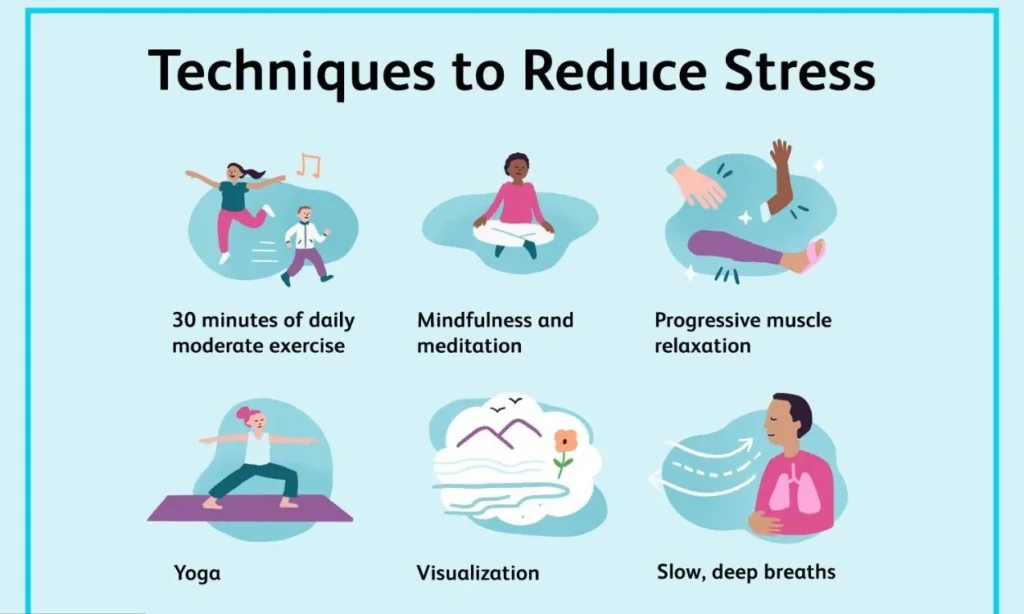Introduction
In today’s fast-paced world, stress has become a common companion for many people. Whether it’s work pressures, personal challenges, or the demands of everyday life, stress can have significant impacts on our physical and mental health. However, managing stress effectively is crucial for maintaining a balanced and healthy life. This article explores a range of practical stress management techniques that can help you navigate daily stressors and enhance your overall well-being.
Understanding Stress
What is Stress?
Stress is the body’s natural response to perceived threats or challenges. It triggers a cascade of physiological reactions, known as the “fight-or-flight” response, preparing the body to either confront or flee from danger. While short-term stress can be beneficial, chronic stress can lead to a host of health problems, including anxiety, depression, cardiovascular diseases, and weakened immune function.
Types of Stress
- Acute Stress: Short-term stress that arises from specific events or situations, such as a work deadline or a sudden argument.
- Chronic Stress: Long-term stress resulting from ongoing situations, such as financial difficulties, job dissatisfaction, or relationship problems.
- Episodic Acute Stress: Frequent episodes of acute stress, often experienced by individuals who tend to worry excessively or have a chaotic lifestyle.
Effective Stress Management Techniques

1. Mindfulness and Meditation
The Practice of Mindfulness
Mindfulness involves paying full attention to the present moment without judgment. It encourages awareness of your thoughts, feelings, and surroundings, helping you to stay grounded and calm. Regular mindfulness practice can reduce stress, improve focus, and enhance emotional resilience.
Meditation Techniques
Meditation is a powerful tool for stress management. There are various forms of meditation, including:
- Guided Meditation: Following a guide who leads you through a meditative process.
- Mindfulness Meditation: Focusing on your breath or a specific sensation to remain present.
- Transcendental Meditation: Using a mantra or repeated word to achieve a deep state of relaxation.
2. Physical Activity
Exercise as a Stress Reliever
Engaging in regular physical activity is one of the most effective ways to manage stress. Exercise increases the production of endorphins, the body’s natural mood elevators, and reduces levels of stress hormones such as cortisol.
Types of Stress-Relieving Exercises
- Aerobic Exercise: Activities like running, swimming, or cycling that increase heart rate and improve cardiovascular health.
- Yoga: Combines physical postures, breathing exercises, and meditation to promote relaxation and reduce stress.
- Strength Training: Lifting weights or performing resistance exercises can also help alleviate stress and improve mental clarity.
3. Breathing Techniques
Deep Breathing
Deep breathing exercises can activate the body’s relaxation response, reducing stress and promoting a sense of calm. Techniques include:
- Diaphragmatic Breathing: Breathing deeply into the diaphragm rather than shallowly into the chest.
- 4-7-8 Breathing: Inhaling for 4 seconds, holding the breath for 7 seconds, and exhaling for 8 seconds.
- Box Breathing: Inhaling, holding, exhaling, and holding the breath again for equal counts, typically 4 seconds each.
4. Time Management
Prioritizing Tasks
Effective time management can significantly reduce stress by helping you prioritize tasks and manage your workload. Techniques include:
- To-Do Lists: Writing down tasks helps organize your day and ensures that you don’t forget important responsibilities.
- Prioritization Matrix: Categorizing tasks by urgency and importance to focus on what matters most.
- Time Blocking: Scheduling specific blocks of time for different activities to maintain focus and productivity.
5. Social Support
The Importance of Connections
Having a strong support network is crucial for managing stress. Sharing your feelings and experiences with trusted friends or family members can provide emotional relief and practical advice.
Building Social Support
- Communicate Regularly: Stay in touch with loved ones through regular phone calls, messages, or in-person visits.
- Join Support Groups: Participate in groups or communities that share similar interests or experiences.
- Seek Professional Help: If stress becomes overwhelming, consider talking to a therapist or counselor.
6. Healthy Lifestyle Choices
Nutrition
A balanced diet plays a vital role in managing stress. Eating nutritious foods can improve your mood, energy levels, and overall health.
- Whole Foods: Incorporate fruits, vegetables, whole grains, lean proteins, and healthy fats into your diet.
- Limit Caffeine and Sugar: Excessive caffeine and sugar can increase anxiety and disrupt sleep patterns.
- Stay Hydrated: Drinking enough water is essential for maintaining physical and mental health.
Sleep
Quality sleep is crucial for stress management. Aim for 7-9 hours of sleep per night and establish a consistent sleep routine.
- Sleep Hygiene: Create a relaxing bedtime routine, avoid screens before bed, and keep your sleep environment comfortable and dark.
- Limit Stimulants: Avoid caffeine and heavy meals close to bedtime.
7. Hobbies and Interests
Engaging in Activities You Enjoy
Pursuing hobbies and interests can provide a meaningful distraction from stress and offer a sense of fulfillment. Activities like reading, gardening, painting, or playing music can be therapeutic and enhance your overall well-being.
8. Cognitive Behavioral Techniques
Reframing Negative Thoughts
Cognitive-behavioral techniques involve changing negative thought patterns to improve stress management. Strategies include:
- Cognitive Restructuring: Identifying and challenging irrational or negative thoughts, and replacing them with positive, realistic ones.
- Gratitude Practice: Focusing on positive aspects of your life by keeping a gratitude journal or reflecting on things you’re thankful for each day.
FAQs
How can mindfulness help with stress management?
Mindfulness helps by promoting awareness of the present moment, reducing anxiety about the past or future, and fostering a sense of calm and relaxation.
What type of exercise is best for reducing stress?
Any form of exercise can reduce stress, but aerobic activities like running, swimming, and yoga are particularly effective due to their impact on endorphin levels and overall well-being.
Can diet affect stress levels?
Yes, a balanced diet with plenty of whole foods, adequate hydration, and limited caffeine and sugar can positively impact stress levels and overall health.
How important is sleep for managing stress?
Sleep is crucial for stress management as it helps restore the body and mind, improves mood, and enhances cognitive function. Aim for 7-9 hours of quality sleep each night.
What are some quick stress relief techniques?
Quick stress relief techniques include deep breathing exercises, short mindfulness practices, brief physical activities, and engaging in a hobby or interest.
Is professional help necessary for stress management?
If stress becomes overwhelming or persistent, seeking professional help from a therapist or counselor can provide valuable support and effective coping strategies.
Conclusion
Managing stress is essential for maintaining a healthy and balanced life. By incorporating these effective stress management techniques into your daily routine, you can reduce stress, enhance your well-being, and improve your overall quality of life. Remember, it’s important to find what works best for you and to practice these techniques consistently. With the right strategies, you can navigate life’s challenges more effectively and enjoy greater peace and resilience.



